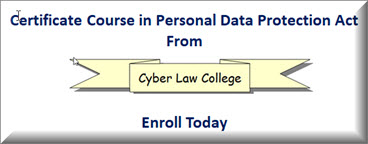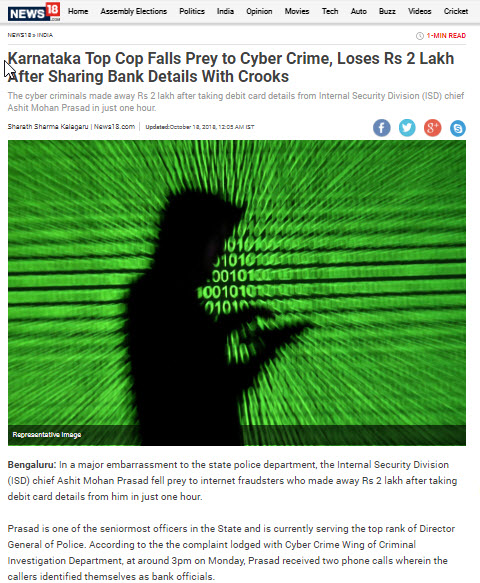Cyber Law College, a pioneer in Cyber Law Education in India is continuing its tradition and has launched a new Course on Personal Data Protection Act (PDPA 2018), which is the first such course in India.
In October 2000, when ITA 2000 was notified, Cyber Law College was one of the first to start an educational initiative with a Certificate Course in Cyber Laws. Subsequently, Cyber Law College has started a course on HIPAA and more recently a Course on GDPR. Presently all the above three courses are available online through www.apnacourse.com with recorded videos from Naavi.
The PDPA 2018 is presently in the form of a Bill and has been presented in the Parliament as a recommendation from the Justice Srikrishna Committee. The Government has collected public comments on the draft Bill and is likely to proceed with the formalities in passing the Act during the winter session of the Parliament.
The Government is under an obligation to the Supreme Court to pass this Act at the earliest, though there could be some hurdles and delays in the process. Considering the pending elections to the Loksabha by May, 2019, it is likely that the Government may push through the Act and if necessary, promulgate an ordinance. This law more or less in the current form is therefore expected to become effective shortly.
Once it becomes a law, it would be as powerful than ITA 2000/8 since the industry has a huge stake in its compliance. All personal data user industries in India need to designate “Data Protection Officers” with relevant knowledge and skills. It will therefore open the doors for employment for Data Protection professionals who have a good knowledge of the law and an understanding of technology.
PDPA 2018 will also introduce a new set of Adjudication and Appellate Tribunal activities exclusively for contraventions of PDPA 2018. There will also be prosecutions under PDPA 2018 by the Police. Hence the knowledge of PDPA 2018 would be a key asset of any law professional.
From the Business perspective, “Persona Data” being an important ingredient of the IT industry, particularly those betting on Big Data and IoT, the incorporation of compliance of PDPA 2018 by design into the business architecture of an organization becomes a key management concern. There will be several new business opportunities that would arise out of this Act which could be harnessed by innovative entrepreneurs.
Hence from the point of view of professionals in the Technology, Law and Management, awareness of PDPA 2018 and a clarity on its provisions becomes important for professional development.
Considering the fact that Formal Academic Institutions are only now gearing up tot he teaching of ITA 2000/8 they will not be able introduce courses on PDPA 2018 for some time. Professionals therefore need to equip themselves either on their own or through courses such as what is being proposed by Cyber Law College.
PDPA 2018 is an amalgamation of some of the provisions of ITA 2000/8 and the international data protection laws such as GDPR and hence this course would provide a reasonable sensitization of the GDPR provisions also.
The course content proposed by Cyber Law College also includes another draft law called DISHA 2018 which is of interest to the Health Care industry in India and is related to HIPAA of USA. The students of this Course will therefore get sensitised to the HIPAA as well.
The Course therefore provides a good opportunity to students and professionals to understand the emerging law and be prepared when the law becomes effective and compliance becomes industry’s a concern immediately thereafter.
The enrollment for the first batch would be available for about one month and the online interactive classes would commence some time in November. (Schedule to be announced).
The Prospectus released by Cyber Law College is available here.
For more details, follow Cyber Law College
Naavi







